Prof. Muhammad Hamid Zaman and Dr. Afreen Siddiqi
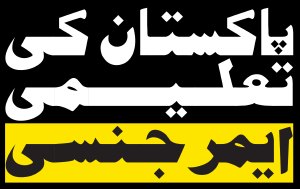 Pakistan’s flood of 2010 was the largest in the country’s history. We still haven’t recovered from the incredible destruction of life, property and infrastructure that it left in its wake. No one can argue that if such a calamity were to occur year after year, the existence of the country would be in jeopardy. The economic impact of a 2010 like flood year after year is no different than the long-term consequence of illiteracy in Pakistan!
Pakistan’s flood of 2010 was the largest in the country’s history. We still haven’t recovered from the incredible destruction of life, property and infrastructure that it left in its wake. No one can argue that if such a calamity were to occur year after year, the existence of the country would be in jeopardy. The economic impact of a 2010 like flood year after year is no different than the long-term consequence of illiteracy in Pakistan!
This evaluation and other mind-numbing statistics were made public earlier this week by the Pakistan Education Task Force. You can find the report here. According to the report, ten percent of all the children in the world, who are not in any school, live in Pakistan. This places Pakistan second on the list of “out-of-school” children in the world. The number of children not in school in Pakistan is around seven million, which is roughly the entire population of Lahore. The numbers are even worse for adults, particularly women in rural areas, where less than a third of the female population has ever attended any school.
Our annual spending on education, which should be at least upwards of 4%, has gone down to 1.5% of our GDP. Perhaps a more shocking fact is that this amount is less than the subsidy given to PIA alone.
The report paints a very bleak, but a detailed picture of our future and our very existence as a nation if we do not do anything about fixing this mess. As we read the report (which all of us should do) and think about 2011 as an year of education emergency, we should ask ourselves two questions: why, and how?
The first question is why are we in a state that we are in? Poverty is a good answer to start with, but it not an accurate one. Roughly twenty-six countries that are poorer than Pakistan have a better education system. Perhaps we can blame the politicians, and not all of it will be unjustified. In a society where lawmakers are illiterate and proud of it, the current state of the education system should not be surprising. But the problem is much bigger and far more complex than any one individual factor. We can go for any scapegoat of our liking, or go for the flavor of the week, but the reality is that we all have not done our part in improving the system.
This takes us to our next question, how do we fix it? This is, perhaps, a more interesting yet more difficult of the two questions. We are interested in finding out what you, our readers, think? How should we address this issue?
We need a multi-faceted, integrated and a broad-based approach. An approach that starts with each home, yours and ours, at the grassroots level. At the same time there is a top-down approach, from the federal and local governments. But it sounds easier than it is. We need to pay for this. How are we going to raise a billion dollars per year (as recommended by the task force) to pay for this? Should we introduce new taxes? If we are ready to dig deep into our pockets for floods and earthquakes, why not education?
The issue of accountability and governance is also central to the fix. With nearly a fourth of our nations teachers absent from school every day, we need better accountability. The role of media, both print and electronic, cannot be understated. But we have to remember that they are not charity, and do not operate like one either. We have to come up with innovative ways of making education attractive and the discussion profitable for them. The public pressure on political parties to make education a central and core mission has to be there. The list of things that we can do is long but the time to do them is not.
Great civilizations, including that of the Indus, were lost due to great floods. Lets get to work, lest we lose ours to the flood of illiteracy.
Dr. Zaman is an Assistant Professor at Boston University and Dr. Siddiqi is a research scientist at Massachusetts Institute of Technology.
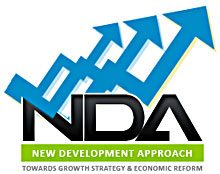 (Editor’s Note: We offer this as sixth in a series on Pakistan’s New Growth Strategy – see here and here and here and here and here. Although not directly related to the growth strategy being devised by the Planning Commission of Pakistan, the issue of education – and the results of the Pakistan Education Task Force are centrally important to that mission. We do hope you will have your say; if we do not speak up, then who will!)
(Editor’s Note: We offer this as sixth in a series on Pakistan’s New Growth Strategy – see here and here and here and here and here. Although not directly related to the growth strategy being devised by the Planning Commission of Pakistan, the issue of education – and the results of the Pakistan Education Task Force are centrally important to that mission. We do hope you will have your say; if we do not speak up, then who will!)


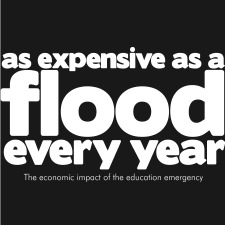
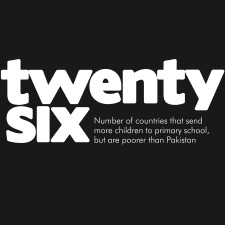
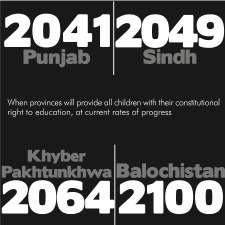
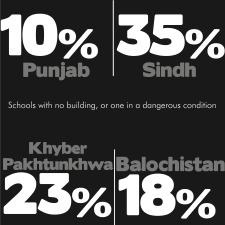
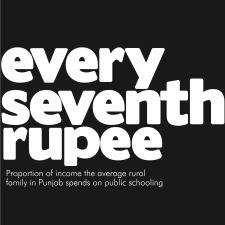
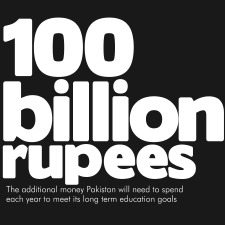
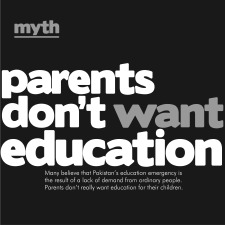
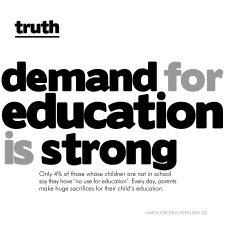

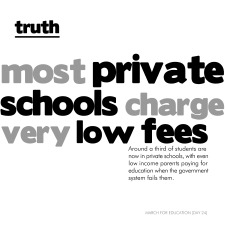
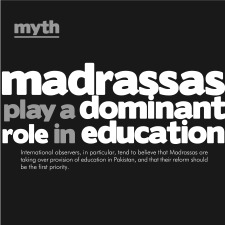
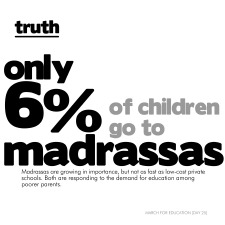
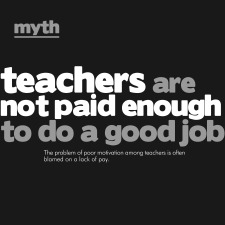
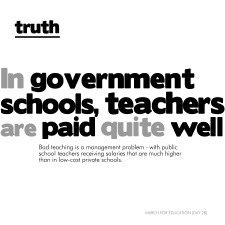




















































Well done Aisha!
Considering English is also a Pakistan’s official language and I don’t know if this is important to any but it is important to me, the incorrect ‘pronunciation’ of the commonly used words by most of the politicians and ministers,
words such as
Law as Laa
School as sacool
measures as myer
Do they not know or they don’t care?
I am a true believer that grassroots is the only way to have any kind of movement and change for the masses as far as education or any other movement goes. When those who need and want it the most, demand it and come up with ways to obtain it, only then will there be any kind of real change. They are then the change-makers, not us, the educated elite who like to come up with fancy prescriptions, as we proclaim them from our ivory towers. The grassroots movements in our country are strong, we need to be able to support them, nurture them – only then will there be true progress. Let us all find and support those who are leaders in their own, rural, urban or similar communities.
The points brought up in this piece are noteworthy and outline the issues well. But, these facts/stats are essentially nothing new, have always been there, continue to be as mind numbing as always, and frankly get worse day by day. Most people who work in the field of development know the issues and the fixes and have known them for decades (nothing new) – the fixes are not the issue, it is an issue of will – but the question is: “Who’s Will”?
I am actually quite stunned by the naive response for ‘why’ we are in the state we are in by the two authors of this article. It is not because of poverty or because of inept politicians or because ‘we’ have not improved our system as they state. While I’d prefer to be optimistic and positive, I feel we need to be harder on ourselves if there is to be any hope. Our society has collectively failed. Our civic ethos is pale, as guided by the prevailing values our educated, landed and economic elite exhibit. Our youth is disenfranchised. I do agree that we have to make institutions more accountable, but that will only happen if the society as a whole already is that way to start with. We are not there yet in the least. We can’t blame just politicians for not being accountable. On a collective basis, we are not holding ourselves accountable and no one here will pay $1B for education. Taxes are a perfect example of the way Pakistani’s feel about ‘giving back’ towards the betterment of society, country and economy – it illustrates the lack of civic duty we feel towards our country on the whole. In a country where people (those who can actually financially afford it, mind you) revolt from paying small businesses a sales tax or GST [this happens all the time in small shops all over the big cities ‘mein kyuN tax duN?], how should they be handled? Are they punished, arrested, jailed?
In a country where opulence drools from every home and driveway of the elite, fewer than 2% of these same people in Pakistan pay any kind of income taxes! [you can see this article for more details on this: http://www.nytimes.com/2010/07/19/world/asia/19tax es.html%5D. How are you going to change the mind of a people who’s moral compass is so terribly flawed, self interested and cannot even enact in one civic duty honestly like paying their income tax?
We will go blue in the face repeating articles like this, or asking 10,000 people to sign petitions. Civic mindedness and duty to country begin at childhood where we teach our children to give back, respect public spaces, volunteer, obey the law, be honest…I don’t see these values overflowing in abundancy in Pakistan; they have to be built, cultivated & sustained over generations and not overnight or after just 1 or 2 natural disasters – I do see these values in countries in Europe, the US, China – all of them are doing well in these sectors, it seems. Unfortunately – until a fundamental change sweeps the psyche of Pakistanis – the ones who are able to be the models for change, and in turn, change-makers, there is little hope as we lack follow through and commitment. Raising awareness is a great step, but I feel we already know that there is an “Education Emergency” – we really must move beyond this late epiphany. Grassroots movements like madrassas spring up where there are no schools provided by the government, and where the need is perceived. The PEOPLE find ways to compensate for this lack. The fact that 6% of children GO to madrassas should be the scary part of the sign on this post, not that “ONLY 6%” go there! Why are they needing to go to madrassas in the first place?
The first way to bring any kind of change or reform to Pakistan is to first cut off our dependencies. We have a failed state, surviving on a drip called foreign aid which is pegged to the ‘war on terror’. When we are forced to enact progress ‘sans’ aid, that is when we will have to find innovative ways to survive and run our country’s finances & institutions on our own. Then, perhaps we will follow how the other ‘economic success story’ countries did it – like S. Korea, Indonesia, Malaysia, etc. These countries realized how important investing in educating their children was if they needed to be less economically dependent on other countries and did so because they didn’t survive on sheer foreign aid. When the people’s own, hard earned income is collected for taxes, then the people will FIGHT harder to make sure their government is held fully accountable, since there will be no other outside source of financial aid to bail them out or line their pockets. When accountability sets in because the population demands it in earnest, then perhaps we will have the ability & moral grounding to demand accountability in other sectors and institutions like education, true land reform, rule of law, etc. We are not ready to demand this yet – we have a lot of work ahead of us before we earn that right.
I think some of this is too dramatic. Education is touted by everyone as the biggest problem but I am not sure if this really is. Its not as if those who are educated have been all model citizens of Pakistan.
Education is seeking, teaching and help the young people discover the truth.
One must have an open mind for evaluating various possibilities that the other viewpoint may be right.
This essentially requires non bigoted liberal and possibly a secular attitude.
To start, there is need for good truthful text books.
The emergency is real. But that is not news. We all know it already. The question is what to do about it. I am afraid neither the task force nor this post answers that.